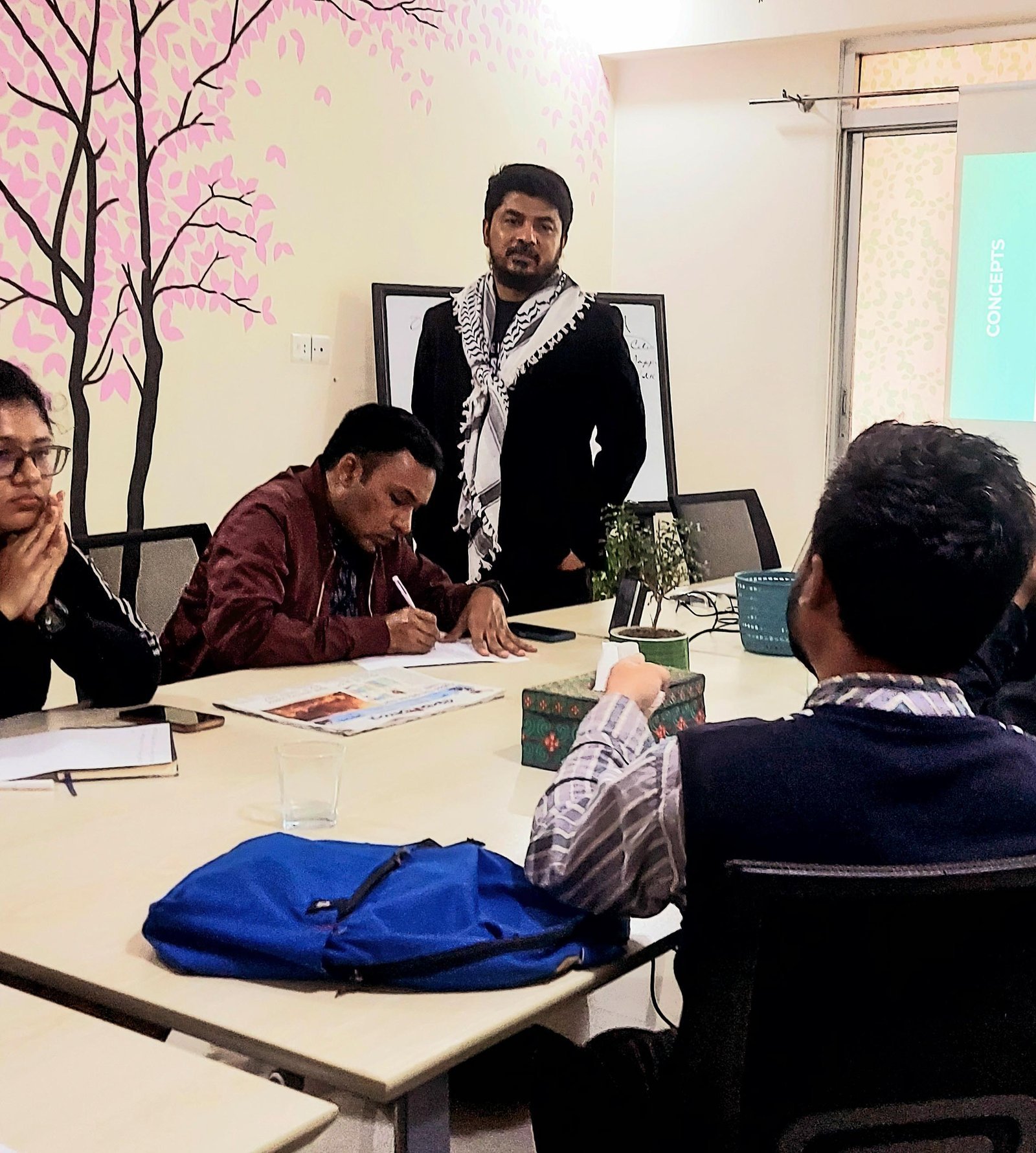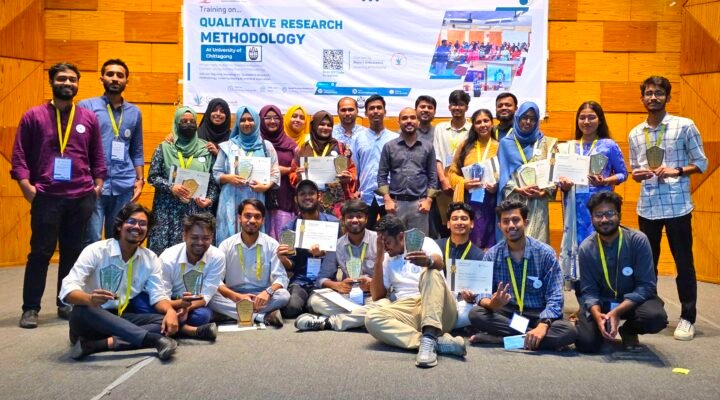On the 22nd of May, 2025, the Department of Anthropology at Jatiya Kabi Kazi Nazrul Islam University hosted a Daylong Seminar on Ethnographic Encounters: Qualitative Data Collection and Analysis Techniques in Social Research. This event, which was facilitated by the Centre for Qualitative Research, brought together academics, researchers, and students to explore the complexities of qualitative research and its application in social studies.

Introduction
Ethnographic research stands as a cornerstone of social research, particularly in understanding cultures, societies, and human behavior. The seminar aimed to offer insights into qualitative data collection and analysis techniques, with a particular focus on ethnography. Ethnographic Research allow researchers to observe and interact with their subjects in natural environments, providing rich, in-depth data that traditional methods might miss. This approach is vital for comprehending the subtleties of human social behavior and cultural dynamics.

In-Depth Sessions and Discussions
The Daylong Seminar on Qualitative research methodology and data analysis techniques was designed to provide both theoretical knowledge and practical insights into qualitative research. The sessions covered a wide range of topics, providing attendees with a comprehensive understanding of the various aspects involved in qualitative data collection and analysis.
1. Understanding Ethnographic Research: A Deep Dive
The seminar began with an introductory session on ethnographic research, where participants gained insight into the significance of ethnography within social research. Ethnography, rooted in anthropology, requires researchers to immerse themselves in the culture they are studying, making it possible to gather rich, detailed insights that are often overlooked by other research methods. The session delved into the evolution of ethnographic methods, its relevance in the modern world, and how it continues to shape studies on social behavior, cultural dynamics, and community engagement.
2. Hands-on Approach to Data Collection Techniques
One of the key highlights of the seminar was the detailed discussion of qualitative data collection methods. Attendees learned about several techniques, including:
-
Participant Observation: Participants were taught how to engage in direct interaction with study groups, while maintaining objectivity, to gain firsthand insight into behaviors and practices.
-
In-Depth Interviews: The seminar emphasized how to conduct thorough, open-ended interviews that allow participants to express their experiences and perspectives freely.
-
Focus Group Discussions (FGDs): The importance of group dynamics and how they can generate richer, more diverse data was explored in this section.
The session also touched upon the challenges associated with data collection, such as dealing with sensitive subjects, managing fieldwork complexities, and ensuring participants’ comfort and safety.
3. Ethnographic Analysis: Turning Data into Meaning
After covering the data collection techniques, the seminar shifted to a session on data analysis. Participants learned how to handle the complexity and depth of qualitative data, often composed of large volumes of text, images, and audio files. Key themes covered included:
-
Coding and Categorization: Understanding how to break down qualitative data into manageable units while identifying patterns and themes.
-
Thematic Analysis: Techniques to classify data according to recurring themes, allowing researchers to draw meaningful conclusions.
-
Grounded Theory: A method to generate theories directly from data, making the analysis process highly inductive.
The session emphasized that unlike quantitative research, qualitative data analysis is flexible and iterative. Researchers must adapt as they work through the data, refining their interpretations and adjusting their approach as necessary.
4. Ethical Challenges and Responsibilities in Ethnography
Ethics plays a pivotal role in ethnographic research, and the seminar provided an in-depth discussion of the ethical principles that researchers must adhere to. Topics covered included:
-
Informed Consent: The importance of obtaining permission from participants before any data collection.
-
Confidentiality: Ensuring that participants’ identities and personal information are protected throughout the research process.
-
Power Dynamics and Researcher Bias: How to avoid exploiting vulnerable populations and addressing the researcher’s biases that may influence the findings.
Participants learned about the ethnographer’s role as not only a researcher but also a representative of the community they are studying. The challenges of balancing objectivity with empathy were also discussed, encouraging attendees to maintain integrity throughout their research.
5. Real-Life Applications of Ethnographic Research
One of the most valuable aspects of the seminar was the case study presentations, where real-world examples of ethnographic research were shared. These case studies illustrated the practical applications of ethnography in fields such as:
-
Community Development: Ethnographic research was shown to provide vital insights into the needs, preferences, and challenges of local communities.
-
Healthcare: The role of ethnography in understanding patient behaviors, doctor-patient relationships, and cultural factors influencing health decisions was explored.
-
Education: The seminar illustrated how ethnographic methods are used in educational research to understand classroom dynamics and student experiences.
-
Urban Planning: Ethnography helps city planners design spaces that are more attuned to the needs and behaviors of the people who use them.
The discussions not only highlighted the versatility of ethnographic methods but also emphasized the potential for research findings to create social change and inform public policy.

Participant Engagement
The seminar offered attendees the opportunity to engage in lively discussions, ask questions, and share their own experiences. This interaction enriched the learning experience, allowing participants to connect theory with practice. The collaborative atmosphere fostered deeper understanding and created networking opportunities among like-minded individuals interested in ethnographic and qualitative research.
Conclusion
The Daylong Seminar on Ethnographic Encounters was an invaluable opportunity for participants to gain firsthand knowledge of qualitative research techniques. The expert-led sessions provided crucial insights into the complexities of data collection and analysis, while also stressing the ethical responsibilities of researchers. The seminar’s success underscores the Centre for Qualitative Research’s ongoing commitment to fostering academic collaboration and advancing the field of qualitative research.
Acknowledgments
We would like to express our gratitude to the Department of Anthropology at Jatiya Kabi Kazi Nazrul Islam University for organizing this insightful event and to the Centre for Qualitative Research for facilitating such an enriching seminar. We also extend our appreciation to all the participants, speakers, and volunteers who made this event a success.



























